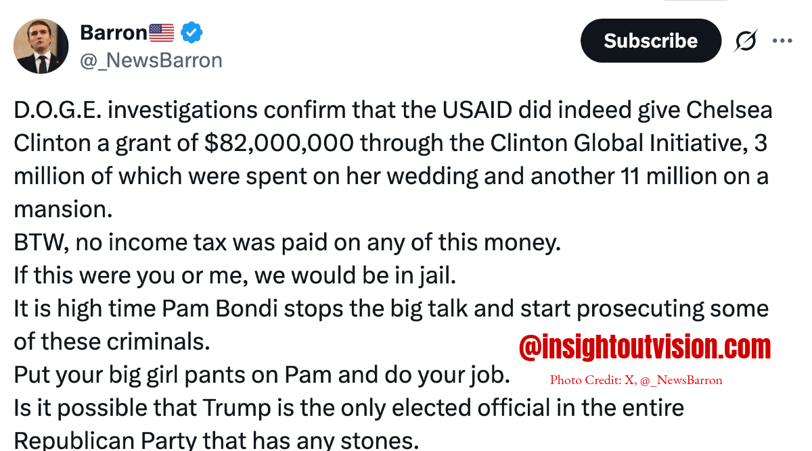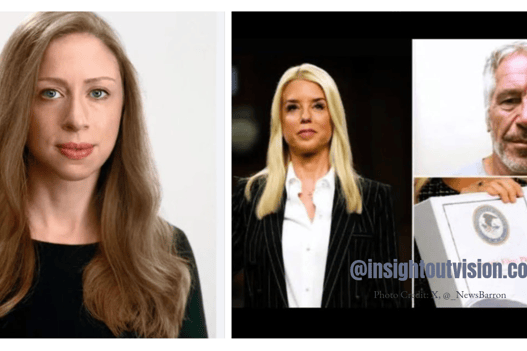Debunking the $82 Million Myth: A Lesson in Media Literacy
5/13/20254 min read


Debunking the $82 Million Myth: A Lesson in Media Literacy
Published: May 12, 2025
By: insightoutvision team
In the age of viral X posts and instant outrage, a single claim can spread like wildfire, igniting debates and fueling distrust. On May 11, 2025, an X post by@_NewsBarron alleged that Chelsea Clinton received an $82 million grant from USAID through the Clinton Global Initiative, with $3 million spent on her wedding and $11 million on a mansion—tax-free. The post called for U.S. Attorney General Pam Bondi to prosecute, claiming “if this were you or me, we would be in jail.” But is this explosive accusation true, or is it a masterclass in misinformation? Let’s dive into the facts, unravel the narrative, and learn how to spot falsehoods in the digital age.
The Viral Claim: A Closer Look
The post in question, which garnered significant attention on X, painted a damning picture:
Allegation 1: USAID granted $82 million to Chelsea Clinton via the Clinton Global Initiative.
Allegation 2: $3 million funded her wedding, and $11 million bought a mansion.
Allegation 3: No income tax was paid on the money.
Call to Action: Pam Bondi should prosecute, with a jab at the Republican Party’s lack of “stones” compared to Trump.
The post included an image of three individuals, one holding a “Clinton Global Initiative” award, visually tying the claim to the Clinton name. Replies amplified the outrage, with users like@Michael55478827 comparing Chelsea’s alleged tax evasion to Wesley Snipes’ prison sentence and @CrownRoyal61161 calling the Clintons “the pond scum of America.” Memes and wedding photos further stoked the fire, but what’s the real story?
Fact-Checking the Claims
Did USAID Give Chelsea Clinton $82 Million?
No. Fact-checks from Newsweek (February 2025) and Snopes debunk this claim entirely. The Clinton Foundation, where Chelsea serves as vice chair, has received federal grants for specific programs—like $7.49 million to the Clinton Health Access Initiative for health services in Zambia—but there’s no record of an $82 million grant to Chelsea or the Clinton Global Initiative (CGI). Chelsea herself has stated her family earns nothing from the Foundation, a claim backed by records showing she hasn’t been compensated since at least 2013.
Were $3 Million and $11 Million Spent on a Wedding and Mansion?
Chelsea Clinton’s 2010 wedding to Marc Mezvinsky was indeed lavish, costing an estimated $3 million, per CNBC. Held at Astor Courts in New York with 400-500 guests, it featured a $11,000 cake and a Vera Wang gown. But there’s zero evidence USAID or Foundation funds were used. Similarly, Chelsea and Marc bought a $10.5 million Manhattan apartment in 2013 (The New York Times), but their wealth comes from their careers—Chelsea as a consultant and Marc as a hedge fund manager—not federal grants.
What About the Tax Claim?
The post’s claim of tax evasion is misleading. The Clinton Foundation is a 501(c)(3) nonprofit, meaning it’s legally exempt from paying income tax on donations, per Wikipedia. This isn’t tax evasion; it’s standard for charities. Charity watchdogs like CharityWatch give the Foundation an A rating, noting 88% of its funds go to its mission. Chelsea, as an individual, would owe taxes on personal income, but since the $82 million grant doesn’t exist, the tax issue is moot.
Why Call Out Pam Bondi?
The post demands action from Pam Bondi, the U.S. Attorney General in 2025, but there’s no crime to prosecute here. The call reflects broader frustration with perceived elite impunity, a sentiment amplified by Elon Musk’s 2025 federal spending crackdown under the Department of Government Efficiency (DOGE). While DOGE has uncovered real waste, this specific claim doesn’t hold water.
Why Did This Rumor Spread?
Misinformation thrives on emotion, and this post hit all the right buttons:
Outrage Factor: Alleging a powerful figure like Chelsea Clinton misused taxpayer money for personal gain taps into widespread distrust of elites.
Political Bias: The Clintons have long been a lightning rod for criticism, with past controversies—like foreign donations to the Foundation (Wikipedia)—fueling narratives of corruption.
Lack of Verification: The post cites “D.O.G.E. investigations” but provides no evidence. Replies with memes and unverified claims (e.g.,
@GlennWhite1
’s “pop quiz” image) further spread the rumor without scrutiny.
Visual Manipulation: The image of a Clinton Global Initiative award in the post creates a false visual link to the allegations, a common tactic to make lies seem credible.
This rumor echoes past misinformation, like a 2012 email leak where Doug Band alleged Chelsea used Foundation resources for her wedding (GOP.com). However, no investigation has substantiated this, and a 2020 Justice Department probe into the Foundation found nothing actionable (Wikipedia).
Media Literacy Lessons
This case offers key takeaways for navigating the digital landscape:
Verify Sources: Claims like “D.O.G.E. investigations confirm” need evidence. Check primary sources like USAspending.gov, which shows no $82 million grant.
Understand Context: Nonprofits like the Clinton Foundation are tax-exempt by law—knowing this prevents misinterpreting standard practices as scandalous.
Question Emotional Triggers: Outrage-driven posts often oversimplify complex issues. Pause and research before sharing.
Cross-Check with Credible Outlets: Fact-checkers like Newsweek, Snopes, and PolitiFact consistently debunked this rumor. Use them to separate fact from fiction.
The Bigger Picture
The viral X post reflects a deeper issue: the erosion of trust in institutions and the ease with which misinformation spreads. In 2025, with initiatives like DOGE exposing government inefficiencies, public skepticism is at an all-time high. But false claims like this one distract from real accountability. The Clintons aren’t saints—past Foundation controversies, like donations tied to Hillary Clinton’s time as Secretary of State, deserve scrutiny—but baseless rumors only muddy the waters.
As consumers of information, we have a responsibility to dig deeper. The next time a post makes your blood boil, take a breath, check the facts, and ask: Is this true, or is it just a good story?
Thought Questions for Readers
Have you ever shared a viral post without verifying its claims? What steps can you take to fact-check next time?
Why do you think misinformation about public figures like the Clintons spreads so easily? How can we combat this trend?
How does the emotional tone of a post—like outrage or sarcasm—affect your perception of its credibility?


Explore deep insights on current events and growth.
Vision
Truth
hello@insightoutvision.com
+1-2236036419
© 2025. All rights reserved.
